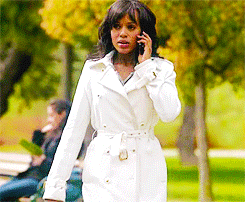When I was a
I love writing dialogue, and I love reading/hearing great dialogue. Snappy banter, witty retorts, juicy monologues. Yes, please, and thank you. The main purposes of dialogue is either to a) get out plot b) reveal character traits c) expose tension. Lots of writers use workmanlike dialogue: it gets the job done without being distracting. And usually the dialogue is enjoyable to read, even sometimes funny. But then there are writers who go the stylized route. Aaron Sorkin, Quentin Tarantino, Kevin Williamson, Kevin Smith, Shonda Rhimes. Their dialogue is heightened and no way would ever get confused with realism.
 |
| Olivia Pope in SCANDAL, aka the best show you're not watching with amazing dialogue and trench coats. |
High school films especially can get away with this. Some of my favorites -- 10 Things I Hate About You, Clueless, Heathers, Easy A, Juno, Bring It On, Brick -- feature characters who sound nothing like real teens. They exchange witty banter, infused with unique vernacular, rapid pop-culture references, and intelligence. Again, I'm salivating here. The dialogue is amazing in these films. When I'm reading a book/watching a movie, I don't want to hear realistic teen talk. I am entering a fictional world filled with fictional characters. How they speak should be just as creative as everything else in their world. That's part of the fun!
10 Things I Hate About You is boss when it comes to this. The dialogue in that movie, especially for Kat, was stuffed with sharp one-liners, delicious back-and-forth, and hyper-articulate characters. The film had the sound of Shakespearean language transplanted into high school. (Seriously, I think my SAT verbal scores improved from everything I watched growing up.)
Some choice quotes:
"Has the fact that you're completely psycho managed to escape your attention?"
"Can we, for two seconds, ignore the fact that you're severely unhinged and discuss my need for a night of teenage normalcy?"
"What is it with this chick? She have beer-flavored nipples?"
"Remove head from sphincter, then drive!"
"People perceive you as somewhat.."
"Tempestuous?"
"'Heinous bitch' is the term used most often."
I could go on
Because even though what they're saying is unrealistic, how they're acting is. And that's the golden rule. The dialogue may be heightened, the plot may be miles from reality, but what characters are feeling and how they're acting must be relatable or else you'll lose your audience. The teens in Dawson's Creek may talk like Rhodes Scholars, but people watching could relate to them and understand the emotion they felt. If your character is talking in sonnets, sure, we'll go with you on that ride. But if his beloved girlfriend cheats on him with his best friend and he just shrugs it off, then we lose interest. Because that is unrealistic and will confuse/frustrate your reader. (note: unless he has a good reason to react the way he does that makes sense within the story and all that jazz, but this is just a broad example)
I believe that creating realistic, relatable characters with heightened, unrealistic dialogue makes the reader experience much more enjoyable. We read books for escape. Watching a show or movie where characters are like us but with better dialogue lets us live vicariously through them. Who doesn't wish they could have witty banter with friends and crushes?
Ok, some more witty banter for the road, courtesy of Easy A:
Woodchuck Todd: [in Woodchuck costume carrying head] Hey Olive.
Olive Penderghast: Oh my God! The illusion is shattered! This is exactly why they put you in the gas chamber if you take your head off at Disney World.
Woodchuck Todd: Actually I think they just, you know, they fire you. You're thinking of Disneyland. Disney World is much more liberal.
Olive Penderghast: Oh yeah! I always forget Disney World went blue in the last election.
How do you feel about dialogue? Are you delighted or distracted by overly articulate teens?



I love it. I loved it when I was a teenager and I love it now. I think everyone wants to think of themselves as being as clever and witty as the people they're watching on TV or reading about in a book. (Of course, none of us are, but to criticize Olivia Pope or Ender Wiggin or Katarina Bishop or Hazel Grace Lancaster whoever for being "too smart" is to admit that WE would not be that smart. And who wants to admit that?)
ReplyDeleteI think criticisms that "this character sounds too smart" are seriously overblown.
That's a good point. I wonder if those who criticize aren't as verbally sharp as these characters, and thus that hinders their ability to relate. I also think those who criticize teen characters for being "too smart" are usually out-of-touch adults.
DeleteWhen I was young, I had a very well spoken friend. He turned out to be a genius. So I think well-spoken young people are very natural.
ReplyDeleteVery true! I never thought about geniuses/prodigies.
DeleteWhat a great point of distinction! Yes, we can get away with sharpened wit and heightened vocabulary, but the TONE must be right.
ReplyDeleteYep. Tone is so important. We have to believe what's behind their words more than what they're actually saying.
DeleteI have a pre-teen and a 20 year old, so listening to witty repartee that isn't real doesn't bother me at all.
ReplyDeleteI LOVE 10 Things I Hate About You! Seriously. I watched it ALL the time in high school! And a HUGE congratulations on your book deal. I've been out of the blogging world for a while and I'm so sorry it took me so long to tell you that. SO awesome! :)
ReplyDeleteThanks for the kind words, Chantele! We're glad to have you back :)
Delete